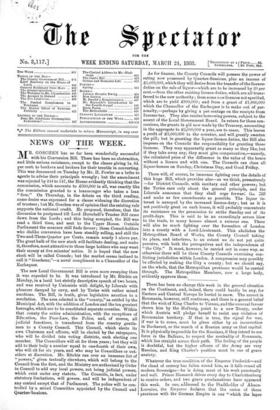Whatever the true condition of the Emperor Frederick—and the cloud
of secrecy has fallen round him, as it falls round all modern Sovereigns—he is doing most of his work punctually and well. Prince Bismarck drives every day to Charlottenburg to receive orders, and two grave proclamations have appeared this week. In one, addressed to the Stadtholder of Alsace- Lorraine, the Emperor declares that the union of these provinces with the German Empire is one "which the lapse of years cannot annul," that his "duty is to cultivate in these territories German ideas and customs," and that he hopes for success "from an impartial administration of justice, and a law-abiding and benevolent government, con- ducted with circumspection, but with a firm hand." In the second, the Emperor observes that he has no aim but the happiness of the Fatherland, and this he hopes to secure by "conscientiously observing the Constitution, and maintaining in all their fulness the rights of the Crown, as well as by trustful co-operation with the representatives of the people." The Emperor is clearly a Hohenzollern, but with a difference. "Trustful co-operation with representatives " is not the sentence which has hitherto described the relations between the Kings of Prussia and their subjects. "You ought to love me, scoundrel," said Frederick William, as he caught a soldier by the throat.



































 Previous page
Previous page